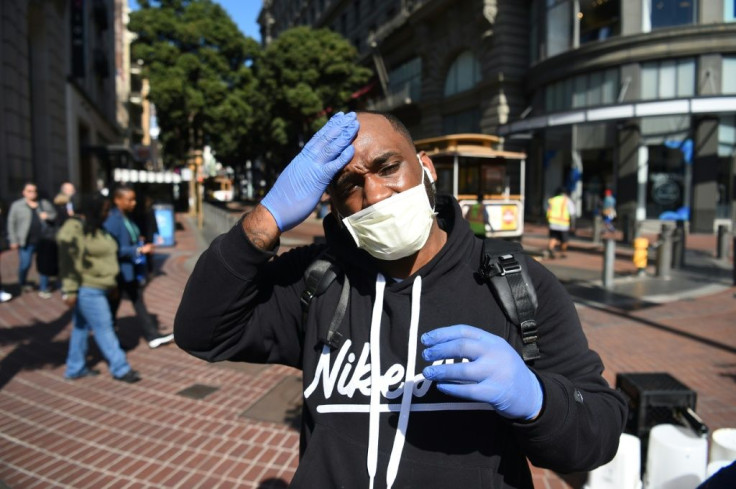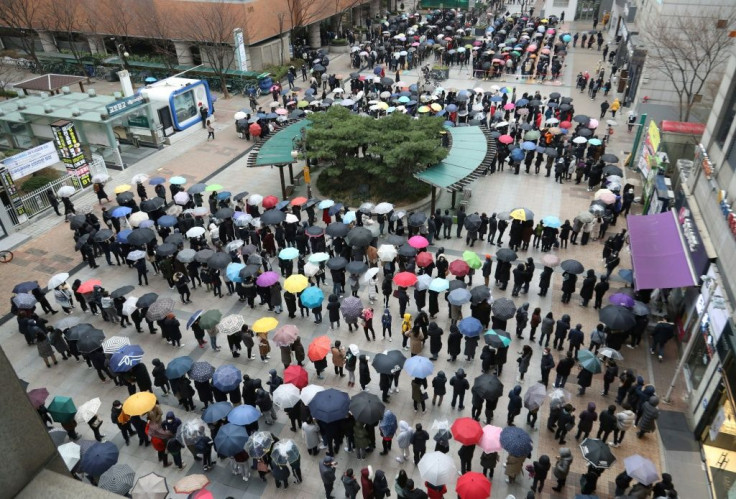Stock Markets Suffer Worst Week Since Financial Crisis

Global stocks slumped again Friday to mark the largest weekly drop since the 2008 global financial crisis over fears the coronavirus could wreak havoc on the world economy.
Crude oil prices tumbled as well and analysts said central banks, especially the US Federal Reserve, might have to shift into crisis-resolution mode with urgent interest rate cuts.
Frankfurt headed the losses in Europe, shedding almost 3.9 percent as the market closed.
Leading European stock markets have lost more than 10 percent in just one week, with London's FTSE 100, which fell by 3.4 percent on Friday, dropping 11.3 percent.
Wall Street also had another difficult day, with the Dow finishing down 1.4 percent at 25,409.36, which meant a drop of more than 12 percent for the week.
But US indices cut their losses after Federal Reserve Chair Jerome Powell released a statement saying the US economy remains "strong" but vowing to "use our tools" to provide support if needed.
The markets in Shanghai, Sydney and Tokyo all closed down 3.0 percent, while Jakarta shed more than four percent.
"The panic mode is full on," said Ipek Ozkardeskaya, senior analyst at Swissquote Bank.
"The coronavirus outbreak has certainly hit businesses, and it might have a longer-than-expected negative impact on company earnings and global growth," she added.
Meanwhile, the Japanese yen continue to benefit from its status as a haven investment in times of economic uncertainty, making solid gains against the dollar.
Yields on 10-year US Treasuries hit new all-time lows.
Concern that global crude demand will crash meanwhile sent oil prices down again: in London, Brent crude fell 3.2 percent, while the US benchmark WTI crude dropped 4.9 percent.
"Another day, another sell-off," remarked analyst Stephen Brennock at energy consultancy PVM Associates.
"Risk assets took a significant step lower... as market players continued to squirm with unease over the growing coronavirus crisis."
In addition to central banks, governments also faced pressure to provide support.
French Economy and Finance Minister Bruno Le Maire said the virus would be considered "a case of force majeure for companies," meaning they would not be penalized if they failed to meet deadlines on public contracts.
The virus has now proliferated worldwide, emerging in every continent except Antarctica, and prompting governments and businesses to curb travel and public gatherings.
On Friday, Nigeria reported the first new coronavirus case in sub-Saharan Africa, as the World Health Organization warned against the "fatal mistake" of complacency. Iceland reported its first case too.

The Geneva International Motor Show was the latest major event to be canceled after Switzerland banned large gatherings.
The virus has killed more than 2,800 people and infected more than 84,000 since late December.
New York - Dow: DOWN 1.4 percent at 25,409.36 (close)
New York - S&P 500: DOWN 0.8 percent at 2,954.22 (close)
New York - Nasdaq: FLAT at 8,567.37 (close)
London - FTSE 100: DOWN 3.2 percent at 6,580.61 (close)
Frankfurt - DAX 30: DOWN 3.9 percent at 11,890.35 (close)
Paris - CAC 40: DOWN 3.4 percent at 5,309.90 (close)
Milan - FTSE MIB: DOWN 3.6 percent at 21,984.21 (close)
EURO STOXX 50: DOWN 3.7 percent at 3,329.49 (close)
Tokyo - Nikkei 225: DOWN 3.7 percent at 21,142.96 (close)
Hong Kong - Hang Seng: DOWN 2.4 percent at 26,129.93 (close)
Shanghai - Composite: DOWN 3.7 percent at 2,880.30 (close)
Dollar/yen: DOWN at 108.06 from 109.59 at 2200 GMT
Euro/dollar: UP at $1.1029 from $1.1001
Pound/dollar: DOWN at $1.2821 from $1.2887
Euro/pound: UP at 86.00 pence from 85.36 pence
Brent Crude: DOWN 3.2 percent at $50.52 per barrel
West Texas Intermediate: DOWN 4.9 percent at $44.76 per barrel
© Copyright AFP 2024. All rights reserved.




















